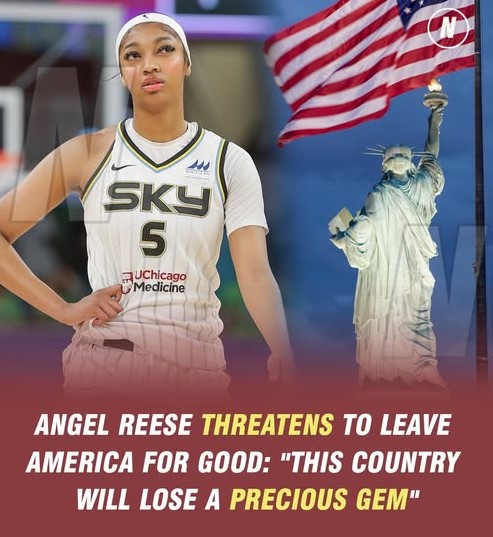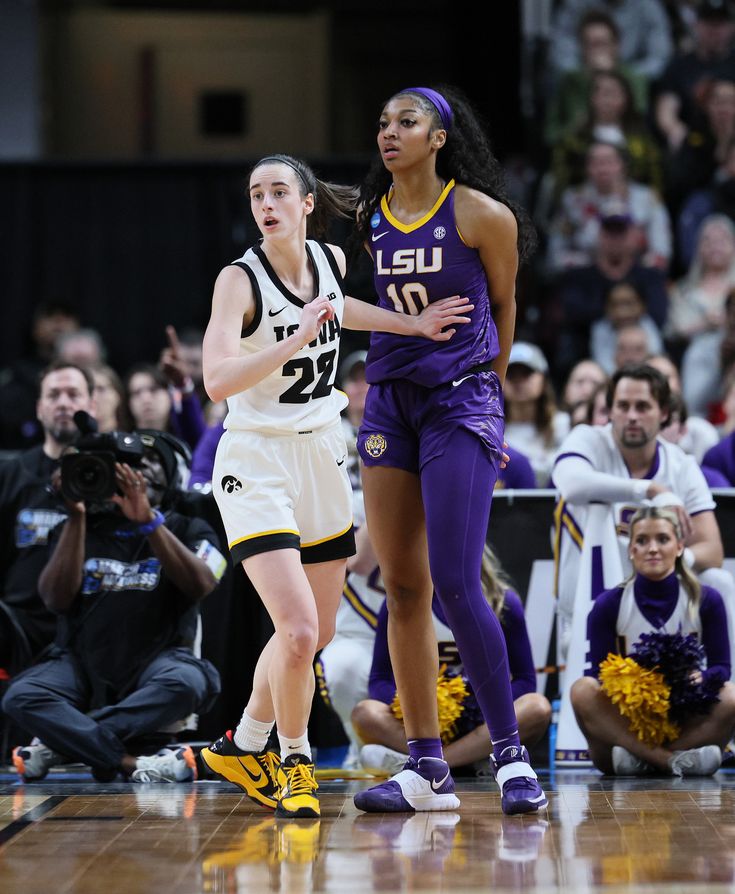Angel Reese, the rising star of women’s basketball, has expressed deep disappointment and frustration after receiving only one vote for WNBA Rookie of the Year (ROTY). This singular vote has apparently been enough to make her question her future in the United States.
The talented forward, known for her exceptional skills and dedication to the game, was widely expected to be a front-runner for the ROTY title following a stellar debut season with the Chicago Sky. Her performance on the court throughout the season had garnered praise from fans, analysts, and fellow players alike, leading many to believe she was a shoe-in for the prestigious award.

Angel Reese’s Shocking Ultimatum: The Dark Side of WNBA Recognition
The basketball world has been rocked by Angel Reese’s explosive declaration that has sent shockwaves through the WNBA community and raised uncomfortable questions about fairness, recognition, and the treatment of promising young athletes in professional sports. When the Chicago Sky forward received only a single vote for Rookie of the Year, her reaction transcended typical disappointment and evolved into something far more dramatic and potentially devastating for American women’s basketball.
Reese’s chilling ultimatum, “If you don’t respect me, you will lose your talent,” represents more than just the frustrated outburst of a disappointed athlete; it embodies a calculated threat that could fundamentally alter the landscape of women’s professional basketball if her warnings are taken seriously. The gravity of her statement becomes even more pronounced when considering that this promising star, who many analysts believed was destined for greatness, is now contemplating abandoning the country that nurtured her basketball dreams in favor of international opportunities that might offer the recognition she feels she deserves.
/cdn.vox-cdn.com/uploads/chorus_asset/file/25470456/2154156011.jpg)
The circumstances surrounding Reese’s solitary ROTY vote have sparked intense debate about the integrity of the voting process and whether underlying biases or personal vendettas may have influenced the outcome in ways that the public has yet to fully understand. Industry insiders have begun whispering about potential conflicts of interest, suggesting that the voting process may have been compromised by factors that extend far beyond simple athletic performance and statistical achievements on the basketball court.
Behind the scenes, sources close to the situation reveal that Reese’s frustration has been building throughout the season, fueled not only by what she perceives as inadequate recognition for her contributions but also by a series of incidents that she believes demonstrate a systematic pattern of disrespect from league officials, media representatives, and even some fellow players. These alleged incidents, which have largely remained hidden from public view, reportedly include everything from scheduling conflicts that seemed to deliberately disadvantage her team to media coverage that consistently downplayed her achievements while amplifying those of her contemporaries.

The timing of Reese’s threat becomes particularly significant when examined in the context of ongoing discussions about player retention in the WNBA and the league’s struggles to maintain its most marketable and talented athletes in an increasingly competitive global basketball market. International leagues, particularly in Europe and Asia, have been aggressively recruiting American talent with lucrative contracts and promises of respect and recognition that some players feel they cannot find in their home country, creating a brain drain that threatens the long-term viability of the WNBA as the premier destination for women’s basketball excellence.
The psychological impact of receiving only one vote cannot be understated, especially for an athlete who entered the professional ranks with such high expectations and who had consistently delivered performances that seemed to warrant serious consideration for the prestigious rookie award. Sports psychologists have noted that such dramatic disparities between expected recognition and actual results can create lasting trauma that affects not only an athlete’s immediate performance but also their long-term relationship with their sport and their willingness to continue competing at the highest levels.
League officials have remained conspicuously silent about Reese’s ultimatum, a silence that some interpret as an indication that they are taking her threat seriously and are working behind the scenes to address her concerns before she follows through on her promise to leave American basketball forever. However, others view this silence as evidence of the very disrespect that Reese has been complaining about, suggesting that the league’s leadership may be fundamentally incapable of recognizing and addressing the legitimate grievances of their most talented players.

The broader implications of Reese’s potential departure extend far beyond the loss of a single talented player, as her exodus could signal to other young athletes that the WNBA is not a league that values or protects its players’ interests and dignity. This perception could create a cascading effect that damages the league’s ability to attract and retain top talent, ultimately undermining the progress that women’s professional basketball has made in recent years and potentially setting back the sport’s development by decades.
As the basketball community awaits Reese’s final decision, the fundamental question remains whether her threat represents a necessary wake-up call that could force positive changes throughout the WNBA system, or whether it signals the beginning of a troubling trend that could see America’s best female basketball players seeking opportunities abroad rather than contributing to the growth and success of their domestic league.